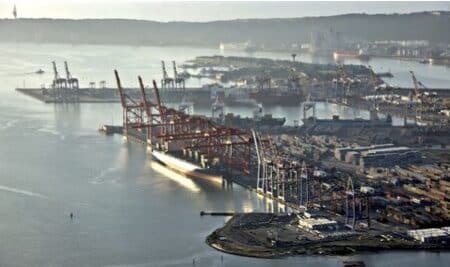South Africa’s port facilities have been ranked near the bottom of the 2021 Container Port Performance Index (CPPI), released by the World Bank and S&P Global Market Intelligence.
The latest edition of the report ranks 370 facilities, an increase from 351 in the 2020 edition. Cape Town comes in at 365th and Durban at 364th. Gqeberha was the highest ranked South African facility, at 312th. The low rankings received by Cape Town and Durban point to the serious work that needs to be done to improve their efficiency and turnaround times. In the absence of such necessary but unglamorous maintenance and upgrading work, government is wasting time and resources hyping up Localisation Master Plans.
The rankings in the CPPI are “based on [the] time vessels needed to spend in port to complete workloads.” The Index uses the metric of ‘total port time’ to determine a port’s performance. Given repeated global supply chain disruptions caused by government lockdowns, changing consumer demands, and various shortages, the operations of various ports would have been severely negatively impacted.
According to the CPPI, “more than four-fifths of global merchandise trade (by volume) is carried by sea.” Furthermore, “a significant and growing portion of that volume, accounting for approximately 35 percent of total volumes and more than 60 percent of commercial value, is carried in containers.” Globalisation may well be shifting, and will take on different forms than what we have been used to up to this point. But, over the short-to-medium term, container shipping is likely to remain a vital part of economic activity – and, as a consequence, of potential economic growth.
The two top-ranked container ports in the CPPI are King Abdullah Port (Saudi Arabia) in first place, followed by the Port of Salalah (Oman) in second place. The ports of Hamad (Qatar), Yangshan (Shanghai, China) and Khalifa (United Arab Emirates) complete the top five. Long Beach and Los Angeles cover the bottom two spots on the Index; no doubt that regulations such as the Jones Act significantly impact on port efficiency in the US. Other notable African ports were Maputo, at 321st, Walvis Bay at 328th, and Luanda, at 366th. Another Mozambican port, Beira, did very well to come in at 270th.
Poor performing ports
The CPPI characterises poorly performing ports as follows: “limitations in spatial and operating efficiency, limitations in maritime and landside access, inadequate oversight, and poor coordination between the public agencies involved, resulting in a lack of predictability and reliability.” When a port does not perform as well as it ought to, it “increases the cost of imports and exports, reduces the competitiveness of its host country and its hinterland, and inhibits economic growth and poverty reduction.”
Given South African ports’ low rankings for two years in a row on the CPPI, as well as the decline in reliability of the country’s railways, neighbouring countries such as Mozambique and Namibia are likely to continue reaping the benefits of increased traffic heading their way, and then south through land border posts. South Africa should be reaping increased benefits from an ongoing commodities boom, but state-control-focused ideology means that entities such as Transnet have been allowed to steadily choke the country’s trade infrastructure for many years now.
The spinning off of the Transnet Ports Authority as an independent entity is supposed to signal a turnaround in the performance of the country’s ports; but up to this point in time, it is unclear whether the board of said Authority is going to be allowed to operate free from political interference.
Will it offer private sector investment, along the same lines as has been floated by Transnet regarding its rail infrastructure?
In the case of rail, Transnet remains as the owner of and custodian of infrastructure – this no doubt will serve as a significant barrier for private sector capital investment. While government has at numerous opportunities reiterated its desire for public-private partnerships, it remains highly unlikely that it will let go of its command-control ideology to the level necessary to allow for real private sector participation and competition.
Moody’s has forecast inflation in South Africa in 2022 at 8%. The CEO of Tiger Brands (South Africa’s largest food producer), Noel Doyle, recently said that he had not, in over 20 years, seen widespread inflation “on this scale – and that it could get worse: in the grains business — probably with the exception of rice — it’s going to be in the upper teens, somewhere north of 15% and up to 20% increases.”
Factory-gate inflation
Stats SA has stated that South Africa’s producer price index raced to 13.1% year-on-year in April, from 11.9% in March; this was the highest read for factory-gate inflation in over 13 years.
Given rising inflation, and the pressure it will add on to the shoulders of low-to-middle income consumers, it is vital for South Africa to lower or eliminate as many cost-increasing regulations and inefficiencies as possible. Opening up the ports for private investment and competition would be one such crucial step.
South Africa can fiddle with Localisation Master Plans, all aimed at ‘re-industrialising’ the country and bolstering the manufacturing sector; but without adequate maintenance and upgrades of basic infrastructure – and in this case, the ports – localisation will remain an elusive, always-promised but never-delivered dream.
Without serious improvements in the country’s port infrastructure, exporters – especially in the Western Cape – will continue to suffer higher costs and slower outputs, and the possible job opportunities that they could provide through increased investments will not materialise.
If you like what you have just read, support the Daily Friend
Click here for a free 30-day trial with the CRA

